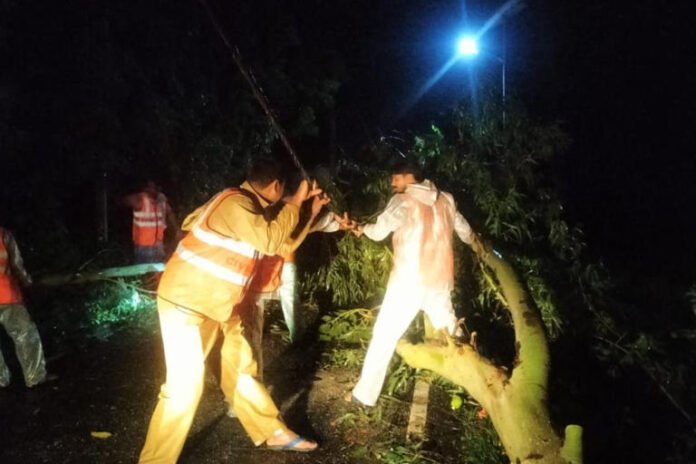Cyclone Remal, a severe storm, has made landfall in coastal West Bengal, bringing with it a trail of destruction and tragedy. As the cyclone battered the region, one person was reported dead in Kolkata, adding to the growing concern and urgency of the situation. The storm has caused widespread damage to infrastructure, disrupted daily life, and posed significant challenges for the authorities and residents alike.
The landfall occurred earlier today, with the cyclone hitting the coastal districts with full force. The India Meteorological Department (IMD) had been closely monitoring Cyclone Remal and issued timely warnings, but the sheer power of the storm has led to unavoidable consequences. Heavy rainfall, gale-force winds, and storm surges have been reported across the affected areas, exacerbating the crisis.
In Kolkata, the death of a resident has been confirmed, marking a grim start to the impact of Cyclone Remal. The individual, a middle-aged man, succumbed to injuries sustained from a fallen tree, highlighting the immediate dangers posed by the cyclone. The city’s emergency services have been stretched thin, responding to numerous calls of fallen trees, damaged buildings, and power outages. The loss of life has intensified the focus on rescue and relief operations.
The coastal districts of West Bengal have borne the brunt of the storm. Towns and villages along the coastline are experiencing severe flooding, with homes submerged and agricultural fields devastated. The high winds have uprooted trees, toppled power lines, and caused extensive damage to both private property and public infrastructure. Local authorities have been working tirelessly to evacuate residents from the most vulnerable areas and provide them with shelter and basic necessities.
The West Bengal government has activated its disaster management protocols, coordinating with the National Disaster Response Force (NDRF) and other agencies to mitigate the impact. Chief Minister Mamata Banerjee has been overseeing the response efforts, urging residents to stay indoors and follow safety advisories. Relief camps have been set up in various locations to accommodate those displaced by the cyclone, with provisions for food, water, and medical aid.
Electricity supply has been severely disrupted in many areas, with power outages reported in both urban and rural regions. The West Bengal State Electricity Distribution Company (WBSEDCL) is working on restoring services, but the extent of the damage means that it will take time before normalcy is restored. Telecommunications have also been affected, complicating communication efforts and coordination of relief operations.
The IMD has forecast that the intensity of Cyclone Remal will gradually decrease as it moves inland, but heavy rains and strong winds will continue to affect the region for the next 24 hours. Authorities have warned of potential landslides in hilly areas and advised residents to remain vigilant. Fishermen have been instructed to avoid venturing into the sea, and ports have been temporarily closed to ensure safety.
As the storm progresses, the focus is on immediate relief and long-term recovery. Non-governmental organizations (NGOs) and community groups have joined hands with the government to provide assistance to those in need. Food packets, clean drinking water, and medical supplies are being distributed in the affected areas, with priority given to the most vulnerable populations, including children, the elderly, and the disabled.
In the wake of Cyclone Remal, the resilience and solidarity of the people of West Bengal are being tested. Communities are coming together to support each other, and volunteers are working round the clock to aid in the relief efforts. The challenges are immense, but the spirit of cooperation and determination is evident as the state navigates through this crisis.
The coming days will be crucial as West Bengal begins to assess the full extent of the damage and plan for recovery. The lessons learned from this experience will be vital in strengthening the state’s preparedness for future natural disasters. For now, the priority remains on saving lives, providing relief, and rebuilding the affected communities.

